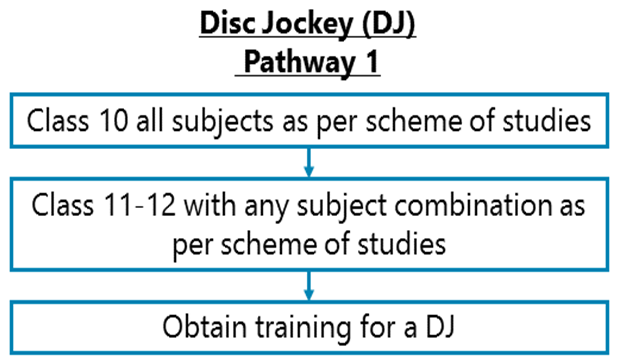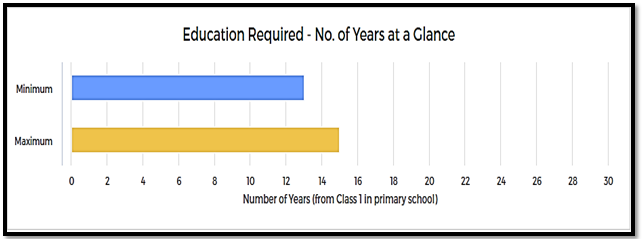Disc Jockey (DJ)
Entry Level Qualification
12
Career Fields
Mass Media, Journalism & Entertainment
For Specially Abled


Career Entrance Exam
About Career
1. As a Disc Jockey, or as popularly known simply as DJ, you will play a variety of recorded music for entertaining a live audience or for television audiences. If you play music for radio audiences, you will be called a Radio Jockey or RJ.
2. You may play music to live audiences at various places and on various occasions. For example, you may play for audiences at a pub, night club, disk, hotel ballroom, private residences, music concerts, etc. DJs are called to celebrate various occasions’ right from an office party and house party to marriages and even during religious occasions.
3. You will be using various digital and analog electronic gadgets to play music such as turntables for playing vinyl records, CD/DVD/MP3 players, DJ Controllers, DJ Mixers, DVS Systems (Digital Vinyl Systems, which convert vinyl sounds into digital sound), DJ effects units (for adding various effects such as a drum beat, bass effects, etc. into recorded songs), DJ Soundcards (for connecting laptop or mobile into a DJ Mixer), DJ Monitors (sound boxes on stage; but many DJs use headphones) etc. Many DJs use various online digital platforms as well.
4. You will use various electronic equipment to play two sources of recorded music simultaneously to mix and play tracks together. You will create beats using breaks and bass line from pre-existing records. Disc jockeys plays at concerts, night clubs and parties.
5. As a Disc Jockey, you need to understand the choice or interest of the target audience while selecting the songs or tracks to be played. You might also be playing as per a pre-decided list or a plan, especially when you work for a television channel or a radio channel.
PARTICULARS | DESCRIPTION |
Name | Disc Jockey (DJ) |
Purpose | Play Recorded Music For an Audience |
Career Field | Mass Media, Journalism & Entertainment |
Required Entrance Exam | No Entrance Exam |
Average Salary | 50000 - 200000 Rs. Per Year |
Companies For You | Radio Jockey, Television, Live Music & Many More |
Who is Eligible | Any One |
Key Roles and Responsibilities
As a Disc Jockey, you will:
1. Ensure that the program is running smoothly by interacting live to the audience.
2. Create your own tracks for pleasing the crowd by mixing or remixing the songs.
3. Need to consider the audience’s preferences while selecting the songs or track to be played.
4. Use electronic equipment for playing two or more sources of recorded music simultaneously by mixing and playing tracks together.
5. Create beats by using breaks and bass line from pre-existing records.
6. Need to understand DJ equipment, music technologies, and sound systems and the ways to operate them.
Career Entry Pathway
Class 10 all subjects as per scheme of studies – Class 11-12 with any subject combination as per scheme of studies – Obtain training for a DJ
Educational qualifications are not important for becoming a DJ. But you may complete Class 11-12 just to give yourself enough time to listen to and appreciate music. It could be a good idea if you learn to play an instrument such as synthesizer, organ, guitar, etc. but it is not mandatory. Playing synthesizer could be very useful but in any case, you can learn to become a DJ by doing online courses only. What is critical is your love for music, different genres of music and your musical intelligence. You must be able to understand a lot about music and various technologies which are used to produce music these days, mostly digital technologies. You can just buy a basic turntable, a mixer and a controller to begin. Even all these mixers and controllers can be done online as well.
Class 10 all subjects as per scheme of studies – Class 11-12 with any subject combination as per scheme of studies – Bachelor’s degree or Diploma in Performing Arts (Music/Music Technology/Similar)
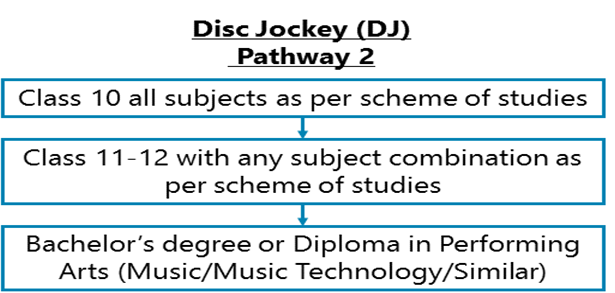
For becoming a Disc Jockey no degree is required, honestly. But if you want to, after your class 11-12, you can do an undergraduate or bachelor’s degree or diploma in Performing Arts with specialization in Music / Music Technology / Music performance or a similar field.
Required Qualification & Competencies
1. If you love playing music, having knowledge of different genres of music and if you have a musical intelligence, then after completing class 11-12 in school you may start obtaining training for becoming a Disc Jockey. You need not pursue any specific career or you need not obtain any specific degree for becoming a DJ.
2. You may also enroll for a Bachelor’s degree or Diploma in Performing Arts (Music/Music Technology/Similar) after completing class 11-12 in school.
MINIMUM EDUCATION REQUIRED | MAXIMUM EDUCATION REQUIRED |
Post Higher Secondary Diploma / Certificate Programs for which the minimum eligibility is a pass in Higher Secondary / Class XII School Leaving examination. | Under Graduate Undergraduate Degree / Honours Diploma / Graduate Diploma (equivalent to a Degree) Programs for which the minimum eligibility is a pass in Higher Secondary / Class XII School Leaving examination. |
Competencies Required
1. Artistic - You should have interests for Artistic Occupations. Artistic occupations mostly involve working with creative ideas, art, and designs. These occupations involve abstract or conceptual thinking, creative self-expression and often do not follow any set processes or rules for getting things done.
2. Enterprising - You should have interests for Enterprising Occupations. Enterprising occupations involve taking initiatives, initiating actions, and planning to achieve goals, often business goals. These involve gathering resources and leading people to get things done. These require decision making, risk-taking, and action orientation.
3. Originality - The ability to come up with unusual or innovative ideas about a given topic or situation, or to develop creative ways to solve a problem.
4. Active Listening - Giving full attention to what other people are saying, understanding the points being made by others, etc.
5. Fluency of Ideas - The ability to come up with a number of ideas about a topic (the number of ideas is important, not their quality, correctness, or creativity).
6. Hearing Sensitivity - The ability to detect or tell the differences between sounds that vary in pitch and loudness.
7. Musical Intelligence - The ability to understand sound variations, rhythms, melody, tones, and music.
Career - Job Opportunities & Profiles
1. To become a DJ, you have to begin playing for small audiences, say, at your school, college, at a relative’s place, etc. With experience, you may get calls to play for various occasions such as private parties, marriages, etc.
2. After you have learned the tricks of the trade and acquired critical DJ equipment, you will get calls to play for larger audiences and also in clubs, disks, night clubs, hotels, private parties of wealthy individuals, etc.
3. With more experience, you may get contracts from night clubs, hotels, disks, etc. as a Resident DJ. You may also get a contractual job offer from a television channel or a radio channel.
4. You could also take part in events like DJ Hunt by a television or radio channel and attempt to win. This could be a sure shot way to become a DJ without much prior experience. You got to be super talented for this, somebody like who eats, drinks and sleeps music.
Specialisation Tracks In This Career
1. DJ (Television)
As a DJ (Disc Jockey), you will be responsible for playing songs on the television and often chat with live audiences. You will make a playlist as per the nature of the TV show that you host and play the songs. You will also play advertising commercials and make various announcements.
2. DJ (Live Music)
As a DJ (Live Music), you will be mixing and playing different music in a live concert for creating a certain feel, entertaining the audience, and maintaining the dance floor active.
3. RJ (Radio Jockey)
As a RJ (Radio Jockey), you will be responsible for playing songs on the radio and often chat with live audiences. You will make a playlist as per the nature of the radio show that you host and play the songs. You will also play advertising jingles and make various announcements.
Career Growth
1. In this career, you grow as you gain more popularity. There is no other way. You might be lucky if you win a DJ or RJ Hunt competition and straightaway become famous. Otherwise, you will have to build your career gig by gig, literally.
2. The more entertained your audiences are, the more reputation you build. The more reputation you build, the more money is paid by the club, night club, hotel, tv and radio channels, event organizers and individuals. It is a highly competitive field. You may remain a small-time DJ throughout your life and might be forced to take up another occupation. But if you are really good, the sky will be your limit.
3. Making into a television and radio channel gives you the maximum exposure and offers you great chances to succeed.
Salary Offered
1. At the beginning of your career, you may not make anything but just perform for gaining experience.
2. Once you make a little bit of name among your known friends, contacts, relatives’ circles, you may expect to earn a little bit of money, such as Rs. 2,000 – 5,000 per gig or performance.
3. Once you are known to a larger number of people, you may make about Rs. 5,000 – 10,000 or more per gig.
4. As a resident DJ in a club, night club, hotel or disk, you may get about Rs. 5,000-12,000 per night, making a cool Rs. 40,000 – 100,000 or more per month, depending upon your reputation.
5. Once your reputation is built in your city, over a region or over the country and especially if event organizers know you well, you may get Rs. 10,000 – 50,000 or even more per gig. If you are really famous, you can make anything between Rs. 2,00,000 – 8,00,000 or even more per gig.
6. In television and radio channels, you are not paid so great in the beginning, but you can surely take home anything between Rs. 30,000 – 50,000 or more per month. Senior and reputed DJs and RJs are paid much more. Some make more than Rs. 10 lac or even a month.
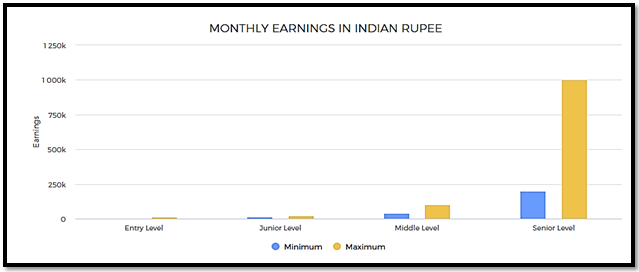
Monthly Earning In Indian Rupee
Entry Level | Junior Level | Mid-Level | Senior Level | |||||
Min Earning | Max Earning | Min Earning | Max Earning | Min Earning | Max Earning | Min Earning | Max Earning | |
6000 | 12000 | 15000 | 20000 | 40000 | 100000 | 200000 | 1000000 | |
1. Entry level: 0 - 2 years of work experience
2. Junior Level: From 1 to 12 years of work experience
3. Mid-Level: From 5 to 20+ years of work experience
4. Senior Level: From 10 to 25+ years of work experience (there could be exceptions in some high-end technical, financial, engineering, creative, management, sports, and other careers; also in the near future, people will reach these levels much faster in many careers and in some careers, these levels will have no meaning as those careers will be completely tech skill driven such as even now, there is almost no level in a Cyber Security Expert’s job)
Work Activities
As a Disc Jockey, you will be involved in some or all the following activities:
1. Performing for people - Performing various tasks for people to entertain them, help them, and assist them.
2. Rendering music - Singing, playing various musical instruments.
3. Developing and maintaining inter-personal relationships - Developing professional relationships with co-workers and others outside organizations and maintaining good relationships.
4. Getting Information and learning - Observing, hearing, and reading using computers, or otherwise obtaining information and learning from it.
5. Decision making and problem-solving - Analysis of data and information; evaluation of alternative decisions and results of decisions; taking the right decisions and solving problems.
6. Scheduling tasks - Scheduling project timelines, tasks and activities.
Future Prospects
The Entertainment industry is growing at a fast pace. With more night clubs opening up and people being exposed to different music from across the globe, the demand for disc jockeys is increasing. As the population is also increasing and more and more people are visiting pubs and night clubs due to the adoption of the western culture, there is an increasing demand for disc jockeys playing different types of music.
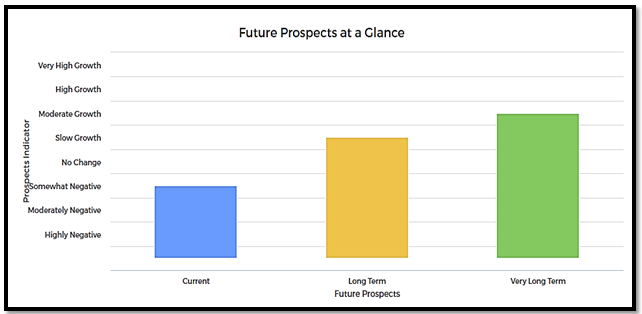
Future Prospects At A Glance
Current (0-1 year) | Long Term (2-5 year) | Very Long Term (6-10 years) |
Somewhat Negative | Slow Growth | Moderate Growth |

